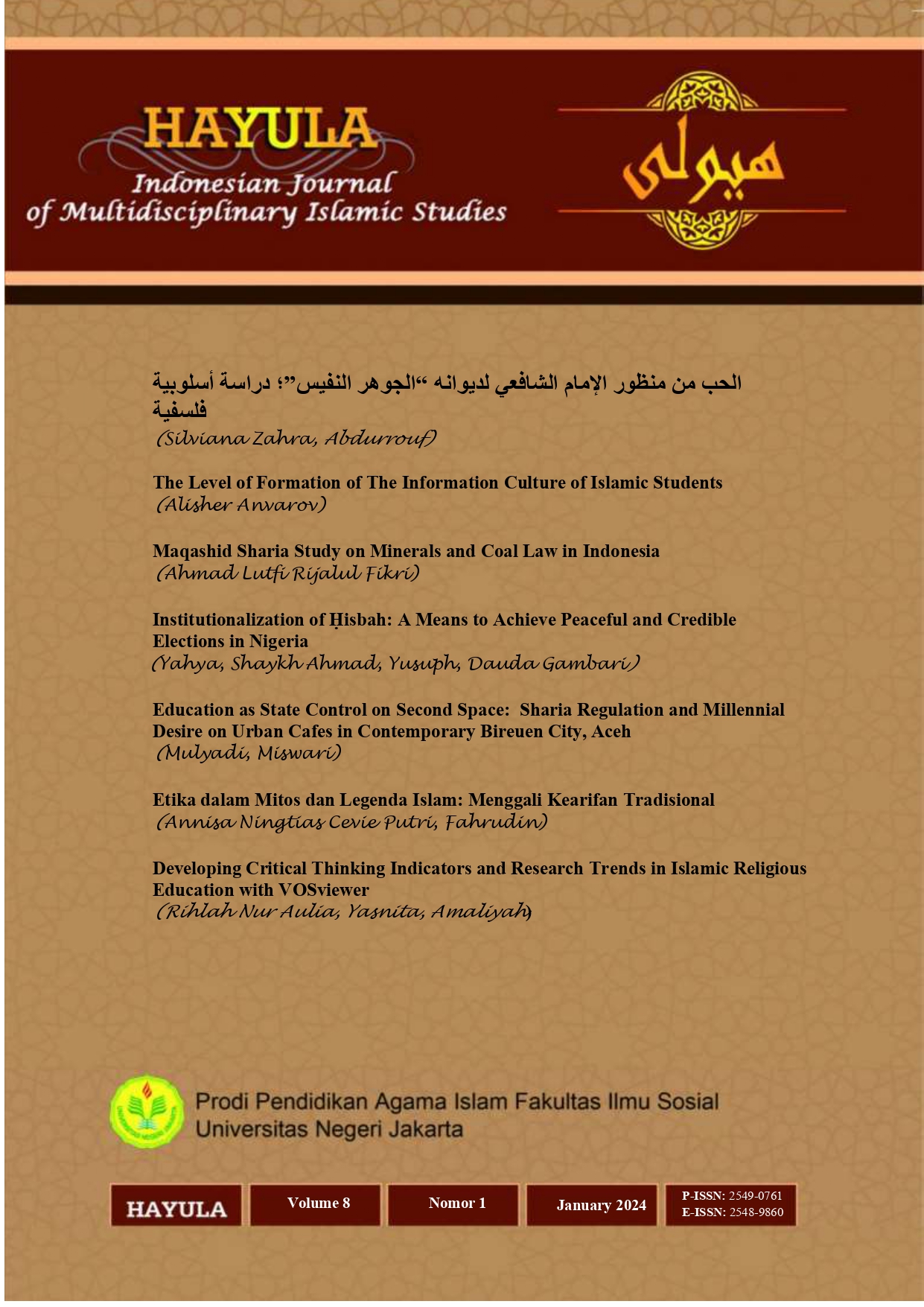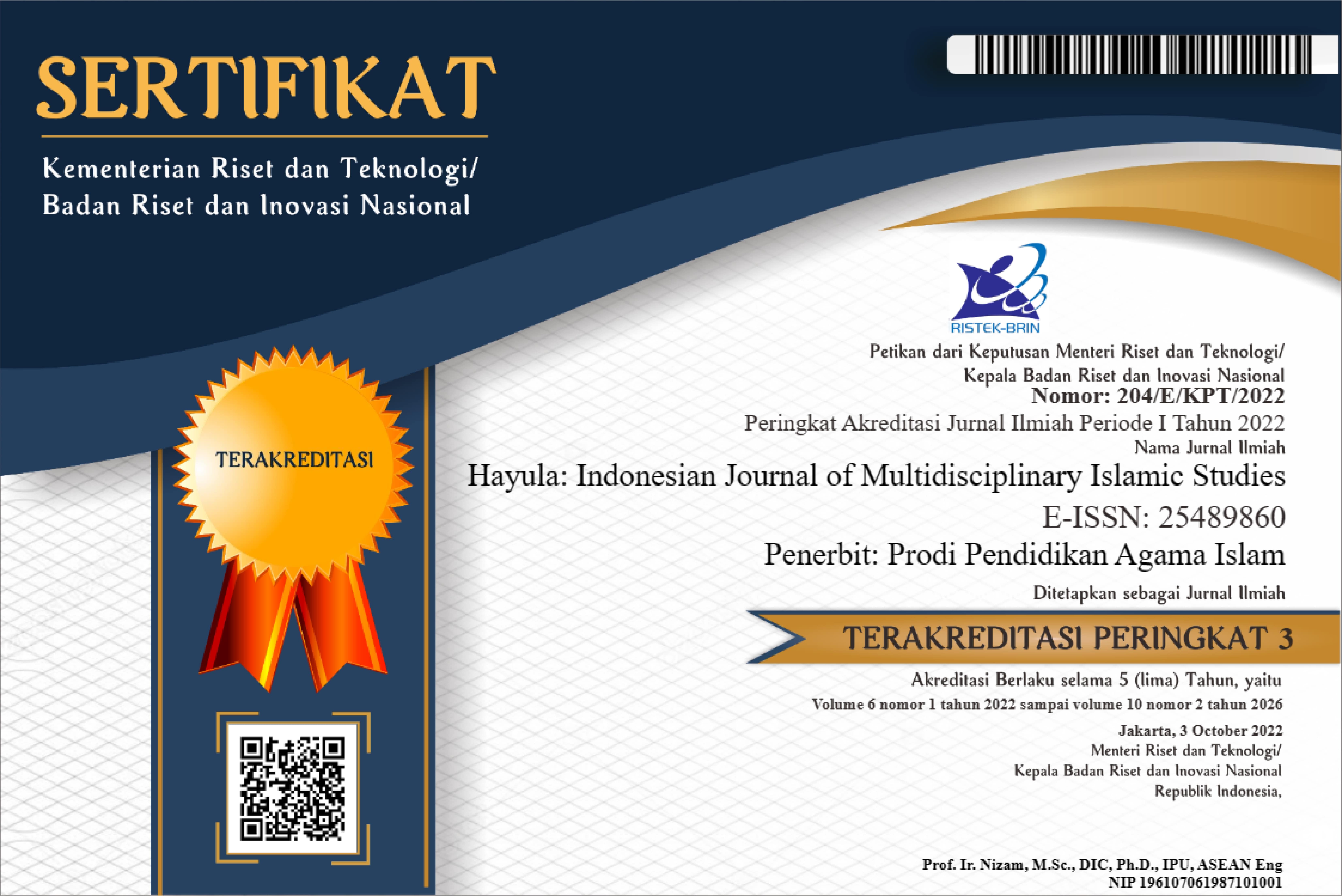Institutionalization of Ḥisbah: A Means to Achieve Peaceful and Credible Elections in Nigeriaa
DOI:
https://doi.org/10.21009/hayula.008.01.04Keywords:
Institutionalisation, Ḥisbah, Peace, Election, Electoral processAbstract
The important pillar of the so-called democracy, which is an election, has been violent and marked by problems ranging from rigging, vote buying, illegal printing of voters’ cards, illegal possession of ballot boxes, stuffing of ballot boxes, underage voting, and falsification of election results to manipulation of results in Nigeria. Thus, the Nigerian experience with elections since independence has been quite challenging despite that conduct of elections is the only acceptable means through which the citizens of a democratic country can choose their representatives. This paper therefore appraises one of the important institutions introduced by Islam to cater to the promotion of good and prohibition of evil (ḥisbah) in society with a view to underline the importance of its institutionalization to stem the menace of electoral malpractices in Nigeria. The reason is that the institution of ḥisbah was successfully deployed during the classical periods of Islam to arrest cases of cheating in the marketplaces as well as the public dispositions. The study employs a qualitative research methodology based on literature review. Data collected from a variety of books, periodicals, and other sources, were then subjected to analysis. The findings of the study reveal that the electoral malpractices that characterized the past elections will be overcome and credible elections will be achieved if ḥisbah is institutionalized in the country. It concludes that the advocacy for its introduction in Nigeria is not an attempt to Islamize the country but a yearning call for the injection of an efficient institution that can change the narrative of electoral fraud in Nigeria as it was practiced in the Northern part of the country before its colonization.
References
Ahmad, J. et al. (2021). Hisbah Institution and its Role in Environmental Conservation in Islamic Civilization, Jurnal Islam Dan Masyarakat Kontemporari. 22(1), retrieved from https://doi.org/10.37231/jimk.2021.22.526 on 10/5/2023
Alamu, T. (2021). Hisbah Meaning: Role and Duties of the Religious Police Force, NGNEWS247, available at http://ngnews247.com on 10/5/ 2023
Al-Bukhārī, M. (1422AH). Ṣaḥīḥu’l-Bukhārī. Beirut: Dāru’n-Najāh.
Al-Ghazālī, A. (n.d). ’Iḥyā’ ‘ulūmi’d-dīn, Beirut: Dāru’l-Ma‘rifah, n.d.
Al-Māturdī, A. (2005). Tafsīru’l-Māturdī, Beirut: Dāru’ṣ-Ṣādir
Al-Māwardī, A. (2006). Al-Ahkam as-Sulṭaniyyah, Cairo: Dāru’l-Ḥadīth.
Arab Encyclopedia, available at www.arab-ncy.com.sy/eency/details/3269/8 on 22-12-2023.
Ash-Shawkānī, M. (1414 AH). Fatḥu’l-Qadīr. Beirut: Dār Ibn Kathīr
As-Sayyid Ṭalhah, A. ’Aḥādīth ’Ummi’l-Mu‘minīn, available at www.library.tebyan.net on 22-12-2023.
Az-Zahbī Muhammad.A. (1985). Siyar ’A‘lāmi’n-Nubalā’, Cairo: Ar-Risālah Foundation.
Babatunde, O.J. (2014). Traditional Administrative Systems in Nigeria, in M.O. Quadri (ed), Traditional Administrative Systems in Nigeria, (Nigeria; NOUN, 2014)
Baker, B. (2004). Protection from Crime: What is on Offer for Africans? Journal of Contemporary African Studies. 2(22)
Barends, M. (2001). The Reintroduction of Islamic Criminal Law in Northern Nigeria. A study conducted on behalf of the European Commission, available at http://europa.eu.int/comm./europeaid/projects/eidhr/pdf/Islamic-criminal-law-nigeria_en.pdf on 5/7/2023
Barkindo, I. (2011). The Role of the Institution of Hisba in the Shari’ah Implementing States in Northern Nigeria, LL.M Thesis of Ahmadu Bello University, Zaria
Dorina, B. (2011). Nigeria’s 2011 Elections: Best Run, but Most Violent, 2011. Washington: United States Institute of Peace, Peace brief 103, https://usip.org/2011/08/nigerias-2011-elections-best-run-most-violent.
Hamza Ateş (2017). A Pioneering Institution for Ombudsman: Hisbah. Ombudsman Akademic. 6. Available at doi:10.32002/ombudsmanakademik.440042.
Hisam Lutfi (2022). Al-Ḥisbah ‘alā’s-Sūq wa dawruhā fī ḍabṭi’l-‘Amaliyyati’t-Tijāriyyah. El-Maaref Review for Researches and Historical Studies. 7(3), available at www.asjp.cerist.dz/en/article/179622.
Ibn ‘Abdil-Barr, A. (1992). Al-Istī‘āb. Baerut: Dāru’l-Jiyal.
Ibn Hazm Aẓ-Ẓāhirī A. (n.d). Alfaṣl fi’l-Milal wa’l-’Ahwā’, Cairo: Al-Khānajī
Ibn Khaldun, A. (n.d). Al-Muqaddimah, Damascus: Dāru Ya‘rib
Ibn Manzūr, M. (1414AH). Lisānu’l-Arab, Beirut: Dāru Ṣādir
Ibn Taymiyyah, A. (1992). Al-Ḥisbah fi’l-’Islām, Beirut: Dāru’l-Kutubi’l-‘Ilmiyyah.
Ibrahim, M. (2022). Sharia Reforms, Hisbah, and the Economy of Moral Policing in Nigeria. Journal for the Study of Religion. 35(2), available at http://dx.doi.org/10.17159/2413-3027/2022/v35n2a2 on 7/4/2023
Joseph, S. (1965). Introduction to Islamic Law. Oxford: Clarendon Press.
Lukman Abolade, (2022). How Nigeria’s religious police, Hisbah repress’ freedom in Kano. The ICIR. Retrieved from www.icirnigeria.org/report- how-nigerias-religious-police-hisbah-repress-freedom-in-Kano/ on 20/12/2023
Manāhij Jāmi‘ati’l-Madīnah, (n.d). Kitābu’l-hisbah, Madinah: Madinah University
Markaz Buḥūthi’d-Dīn wa’l-Fiṭrah, (2018). Sababu Qitāli Abi-Bakr Lil-Murtaddīn, available at www.hablullah.com/?p=3161 on 10/12/2023.
Michael, O. (2010). A Culture of Failed Elections: Revisiting Democratic Elections in Nigeria, 1959-2003, Historical Actual Online, available at www.dialnet.unirioja.es on 5/6/2023.
Mohd Ab Malek Md Shah et. al (2013). The Institution of Hisbah: In the Purview of Its Significances and Development. Global Journal of Business and Social Science. 1 (3). Retrieved from www.gatrenterprise.com/GATRJournals/index.html 8/1/2023.
Murtala, R. (2019). The Role of Muhtasib in the Control of Grains Trade in Sokoto Metropolis 1812-1903. International Journal of Humanities and Social Science Research.
5(3) Retrieved from https://socialsciencejournal.in, on 12/6/2023.
Muhamedi M. & Arifin, M.Y.M (2017). Management Communication Practices in the Islamic Perspective. Journal of Creative Writing. 3(01).
Muslim, A. n.d. Ṣaḥīh Muslim, Baerut: Dāru ’Iḥyāhi’ t-Turāth
Mustapha, A. and Ismail, M. (2016). Sharia Implementation in Northern Nigeria over 15 Years: The Case of Hisbah, available at http://qeh.ox.ac.ik/content/sharia-implementation-northern-nigeria-after-15years on 10/5/2023.
Mustapha et al (2019). The Moderating Role of Hisbah Principles on the Relationship beween Islamic Culture. International Journal of Innovation, Creativity and Change. 5(2). Available at www.ijicc.net.
Opeyemi, L. (2023). From 1.5b to 305b. How Cost of Nigerian Elections Rose in 24 Years, Foundation for Investigative Journalism, available at http://fij.mg/article/from-n1-5bn-to-n305b-how-cost-of-nigerian-elections-rose-in-24years/ on 10/6/2023.
Osamiudiamen Obasogie (2022). Hisbah is Illegal in Nigeria, available at www.legamart.com/articles/hisbah-is-illegal-in-nigeria/ on 11/12/2023.
Punch Editorial Board (2020). Stopping Hisbah’s Human Rights Violation, the Punch, available at www.google.com/amp/s/puchng.com/stopping-hisbahs-human-rights-violations/%3famp on 18/12/2023.
Rasheed, O. O. (2011). Hisbah and Sharia Law Enforcement in Metropolitan Kano. Africa Today. 57(4)
Rasheed, O.O. (2005). Community Vigilantes in Metropolitan Kano 1985-2005, Nigeria: IFRA.
Riḍā R. 1990. Al-Manar, Cairo: Al-Hayhatu’l-Maṣriyyatu’l-‘Ammah li’l-Kitāb
Sulayman, H. (1996). Al-’Amr bi’l-Ma’rūf wan’ Nahy ‘ani’l-Munkar, Al-Makabatu’sh-Shāmilah software.
Tambari, A. (2021). The Institution of Hisbah and the Effects of Colonial Administration on its Activities in the Sokoto Caliphate. International Journal of Theology and Reformed Tradition, available at www.academicexcellencesociety.com/the-institution-of-hisbah-and-the-effects on 5-7-2023.
Tope, T. (2018). Unbundling N254bn Budget for 2019 elections, The Guardian, available at http://guardian.ng/features/unbundling-n254bn-budget-for-2019-elecions/ on 3/7/2023.
Usman Musapha (2023). Islamic scholar calls for establishment of Hisbah in Katsina, The Daily Nigerian, www.dailynigerian.com/islamic-scholar-calls/ .
Yahya, S.A. (2019). A Discourse on the Experiences of Selected Prophets in Sūratu Hūd: Lessons for the Contemporary Society, Voyages Journal of Religious Studies, 5 (1) Gombe: Department of Religious Studies, Gombe State University, Gombe, Nigeria.
Downloads
Published
How to Cite
Issue
Section
License
Authors who publish with this Journal agree to the following terms:
- Author retain copyright and grant the journal right of first publication with the work simultaneously licensed under a creative commons attribution licensethat allow others to share the work within an acknowledgement of the work’s authorship and initial publication of this journal.
- Authors are able to enter into separate, additional contractual arrangementfor the non-exclusive distribution of the journal’s published version of the work (e.g. acknowledgement of its initial publication in this journal).
- Authors are permitted and encouraged to post their work online(e.g. in institutional repositories or on their websites) prior to and during the submission process, as it can lead to productive exchanges, as well as earlier and greater citation of published works.
Users/public use of this website will be licensed to CC BY







